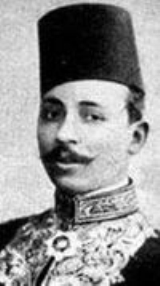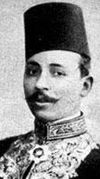
Mustafa Kamil
Encyclopedia

Pasha
Pasha or pascha, formerly bashaw, was a high rank in the Ottoman Empire political system, typically granted to governors, generals and dignitaries. As an honorary title, Pasha, in one of its various ranks, is equivalent to the British title of Lord, and was also one of the highest titles in...
(August 14, 1874, Cairo
Cairo
Cairo , is the capital of Egypt and the largest city in the Arab world and Africa, and the 16th largest metropolitan area in the world. Nicknamed "The City of a Thousand Minarets" for its preponderance of Islamic architecture, Cairo has long been a centre of the region's political and cultural life...
, Egypt
Egypt
Egypt , officially the Arab Republic of Egypt, Arabic: , is a country mainly in North Africa, with the Sinai Peninsula forming a land bridge in Southwest Asia. Egypt is thus a transcontinental country, and a major power in Africa, the Mediterranean Basin, the Middle East and the Muslim world...
– February 10, 1908, Cairo
Cairo
Cairo , is the capital of Egypt and the largest city in the Arab world and Africa, and the 16th largest metropolitan area in the world. Nicknamed "The City of a Thousand Minarets" for its preponderance of Islamic architecture, Cairo has long been a centre of the region's political and cultural life...
) was an Egyptian
Egyptians
Egyptians are nation an ethnic group made up of Mediterranean North Africans, the indigenous people of Egypt.Egyptian identity is closely tied to geography. The population of Egypt is concentrated in the lower Nile Valley, the small strip of cultivable land stretching from the First Cataract to...
lawyer, journalist, and nationalist activist.
Biography
The son of an Egyptian army officer, Kamil was trained as a lawyer at the French law school in Cairo and the Law Faculty at the University of ToulouseUniversity of Toulouse
The Université de Toulouse is a consortium of French universities, grandes écoles and other institutions of higher education and research, named after one of the earliest universities established in Europe in 1229, and including the successor universities to that earlier university...
in France. As a passionate nationalist, he supported Egypt's khedive
Khedive
The term Khedive is a title largely equivalent to the English word viceroy. It was first used, without official recognition, by Muhammad Ali Pasha , the Wāli of Egypt and Sudan, and vassal of the Ottoman Empire...
, Abbas Hilmi II, who strongly opposed the United Kingdom
United Kingdom
The United Kingdom of Great Britain and Northern IrelandIn the United Kingdom and Dependencies, other languages have been officially recognised as legitimate autochthonous languages under the European Charter for Regional or Minority Languages...
's occupation of Egypt
Egypt
Egypt , officially the Arab Republic of Egypt, Arabic: , is a country mainly in North Africa, with the Sinai Peninsula forming a land bridge in Southwest Asia. Egypt is thus a transcontinental country, and a major power in Africa, the Mediterranean Basin, the Middle East and the Muslim world...
and Sudan
Sudan
Sudan , officially the Republic of the Sudan , is a country in North Africa, sometimes considered part of the Middle East politically. It is bordered by Egypt to the north, the Red Sea to the northeast, Eritrea and Ethiopia to the east, South Sudan to the south, the Central African Republic to the...
. He also sought co-operation with France
France
The French Republic , The French Republic , The French Republic , (commonly known as France , is a unitary semi-presidential republic in Western Europe with several overseas territories and islands located on other continents and in the Indian, Pacific, and Atlantic oceans. Metropolitan France...
and the Ottoman Empire
Ottoman Empire
The Ottoman EmpireIt was usually referred to as the "Ottoman Empire", the "Turkish Empire", the "Ottoman Caliphate" or more commonly "Turkey" by its contemporaries...
, but later he gradually grew more independent of outside backers, and appealed mainly to the Egyptian people to demand the end of the British occupation. He also called on Khedive Abbas to grant constitutional government to his subjects.
In 1900, Kamil founded the newspaper Al-Liwa' ("The Standard") as a platform for his views and utilized his skill as both a journalist and lawyer. He also founded a boys' school open to Egyptian Muslims, Christians, and Jews. His cause was strengthened by the Dinshaway Incident in June 1906 in which four peasants were hastily tried and hanged for having assaulted uniformed British officers who were shooting pigeons in their village.
He was supported strongly by Mohammad Farid
Mohammad Farid
This article is about the Egyptian political figure. For the former Afghan football coach, see Mohammad Farid Mohammad Farid or Muhammad Farîd was an influential Egyptian political figure of Turkish ancestry...
, a prominent member of Egypt and Sudan's aristocracy. With Farid's assistance, Kamil founded the National Party in December 1907, two months before his death. His funeral was the occasion for a massive demonstration of popular grief. Farid, who spent his last penny supporting the country's national liberation movement, became the leader of the National Party after Kamil's death.
The mausoleum of Mustafa Kamil (built between 1949-53) close to Cairo's Citadel in neo-Mamluk style is open to the public as a museum, and holds in a side room a display of memorabilia related to him.
Kamil is remembered as a fervent Egyptian nationalist, and an articulate advocate of Egyptian independence. The current Egyptian national anthem (Bilady) is thought to have been inspired by one of Mustafa Kamil's speeches.
- "If I weren't an Egyptian, I would have wished to be an Egyptian," one of most famous quotes in Egyptian modern history, was said by Mustafa Kamil.
Fazlur Rahman Malik argues that even though he was necessarily secular, his nationalism was inspired by an Islam
Islam
Islam . The most common are and . : Arabic pronunciation varies regionally. The first vowel ranges from ~~. The second vowel ranges from ~~~...
ic past. This appears to be the natural conclusion as Egypt had remained under the Islamic Caliphate system for centuries before. The British often accused him of advocating pan-Islam, and it is well known that he supported the Ottoman Sultan against the Egyptian Government and the British who dominated Egypt in the dispute over Taba in May 1906.

